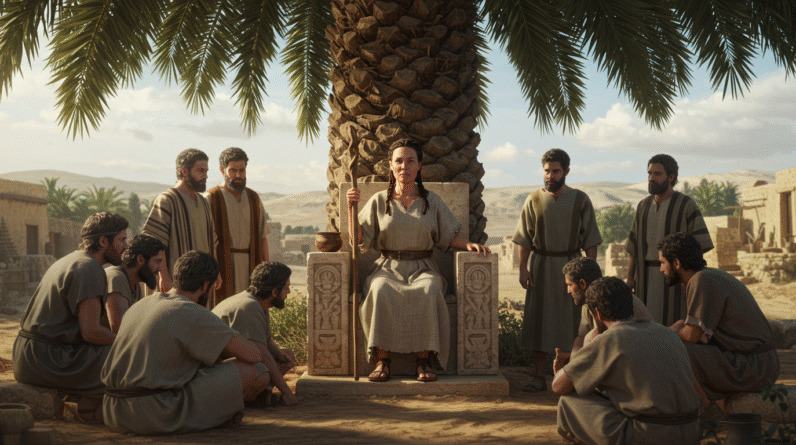Delve into the tumultuous life of Abimelech, a self-proclaimed king whose ambition led to his downfall in Israel’s history. Discover lessons of power and integrity.
Abimelech: A Complex Figure in Israel’s History

Introduction
Abimelech: even the name conjures a storm of intrigue and contradiction tangled in the tapestry of Israel’s early history. While not a judge in the traditional sense, his story is nonetheless pivotal, presenting a tale of power, ambition, and downfall that speaks volumes about the time in which he lived. Abimelech’s life is a crucial thread in the broader narrative of Israel’s tumultuous journey through the era of the Judges, a period after Joshua’s leadership and before the dawn of the Israelite monarchy. His ambition to be king, even if self-proclaimed, along with his impact on the historical and spiritual landscape, makes him a character worth delving into.
Early Life and Background
Born as the son of Gideon—also known as Jerubbaal—Abimelech grew up in a family that had tasted the sweetness of triumph and the bitterness of family conflict. Gideon, one of Israel’s renowned judges, left a substantial legacy, but Abimelech’s upbringing in such an atmosphere could have sown seeds of ambition in his heart. His mother was a concubine from Shechem, a detail that significantly shaped his pathway to power and influenced his alliance with the people of Shechem (Judges 8:31). The cultural milieu of the time was marked by the struggle for identity and survival. Israel, still finding its footing in the promised land, was rife with conflicts both internal and external. Abimelech, with a foot in his father’s legacy and a hand reaching for something greater, represents a tumultuous era where leaders sought to unify or divide for their gain.
The Calling and Rise to Leadership
Abimelech’s ascent to power is anything but divinely ordained in the way many other leaders were called. Unlike Gideon, who hesitated until he received signs from God, Abimelech took the reins of leadership aggressively and audaciously (Judges 9:1-6). He declared himself king through a strategic and brutal plan, proposing to his mother’s family that it was better for one man—him—to rule rather than the seventy sons of Gideon. This proposal led to his unscrupulous massacre of his half-brothers, save for the youngest, Jotham, who escaped. Abimelech’s story is unique in that God’s calling was absent; instead, it was Abimelech’s ambition that propelled him to leadership, presenting a complex narrative amid God’s covenant people.
Key Events and Victories
The reunion of Abimelech with Shechem and its leaders marked the ignition of his claimed kingship. His reign, described over a period of three years, was more of an uneasy coalition than a period of unified leadership (Judges 9:22). God allowed an evil spirit to create discord between Abimelech and the citizens of Shechem, setting the scene for betrayal and insurrections. One notable challenge was the revolt led by Gaal son of Ebed, sparking a significant battle over the control of Shechem (Judges 9:23-41). Abimelech crushed the uprising with an iron hand, demonstrating his strategic military mind and ruthless approach. Despite the deceit and violence that marked his victories, these events underscore how Abimelech’s rule was far from peaceful or secure, serving as a stark contrast to God-ordained deliverance through divinely empowered judges.
Their Leadership Style
Supporters might describe Abimelech’s leadership as bold and assertive, while critics would undoubtedly highlight his dictatorial tendencies and penchant for violence. He ruled with fear and manipulation, a stark difference from judges like Deborah or Gideon, who sought divine guidance. Despite the power he wielded, Abimelech’s manner did not bring about lasting peace or unity among the Israelites. Instead, his leadership became synonymous with chaos and bloodshed. His decisions, often self-centered and destructive, were devoid of the wisdom typically associated with Israel’s judges.
Challenges and Failures
Abimelech’s reign ended as turbulently as it began. His downfall came during the siege of Thebez, where a woman dropped a millstone from the city wall, fatally wounding him (Judges 9:50-54). In his final moments, he asked his armor-bearer to slay him with a sword to avoid the shame of being killed by a woman. Even in death, Abimelech’s concern was not repentance or reflection but reputation. His failure to establish a stable rule and his demise from overambition serve as poignant reminders of the perils of unchecked power. His story ends in tragedy, a lesson in the futility of pursuing power at any cost.
The Legacy of Abimelech
Abimelech’s legacy is one of caution rather than commendation. His tale leaves an indelible mark on Israel’s collective memory as a sobering reminder of what can happen when leaders usurp God’s authority. Abimelech’s life illustrates the fleeting nature of power gained through treachery and violence, and his story continued to echo through the annals of Israel’s history as a warning against self-serving leadership. Although not celebrated as a hero of faith, Abimelech’s narrative nonetheless contributes to the intricate saga of Israel, influencing future generations to consider the source and style of their leadership and the sobering consequences of ambition without integrity.
Life Lessons and Application
From Abimelech’s life, we glean lessons on the importance of integrity, humility, and divine guidance in leadership. Modern readers can reflect on his story to understand the dangers of pursuing personal goals without consideration for collective well-being or divine purpose. Abimelech’s ambition drove him to actions that ultimately resulted in mutual destruction, a pattern seen throughout history, both ancient and contemporary. His tale, while unsettling, prompts a reflection on the kinds of leaders we become and support, emphasizing qualities of selflessness and a commitment to serving others over oneself.
Conclusion
As we reflect on Abimelech’s story, it offers a narrative that invites caution and contemplation. His life, characterized by ruthless ambition and imposing authority, ultimately leads to a tragic end. Unlike leaders who acted with divine inspiration, Abimelech’s legacy is a testimony to the dangers of power pursued without righteousness. Despite his negative impact, his story encourages us to consider how we might seek divine guidance in our pursuits, ensuring we lead with integrity and for the benefit of those we serve.
Quotes or Scriptures from the Bible
Throughout his story, key scriptures illuminate Abimelech’s life and choices:
- “Judges 9:1-6“: Here, we see Abimelech’s audacious proposal and ruthless rise to power.
- “Judges 9:23“: God sends an evil spirit, indicating His disapproval of Abimelech’s reign.
- “Judges 9:50-54“: The dramatic downfall of Abimelech at Thebez.
Historical and Cultural Context
In Abimelech’s time, Israel was a loose confederation of tribes often at odds internally and externally. The absence of a strong, centralized leadership structure made Israel vulnerable to both internal power struggles and external threats. As the son of Gideon, Abimelech found himself uniquely positioned amid these tensions, ultimately using them to his advantage. This period in Israel’s history was marked by intermittent turmoil, cycles of sin and repentance, and the struggle to maintain covenant faithfulness amidst constant adversity. Understanding this context enriches the lessons drawn from Abimelech’s life.
Prayer or Reflection
May Abimelech’s story remind us of the importance of seeking God’s guidance in our leadership and personal endeavors. Let us strive for lives marked by integrity, wisdom, and service to others, learning from the cautionary tales of history. Amen.
Acknowledgment: All Bible verses referenced in this article were accessed via Bible Gateway (or Bible Hub).







